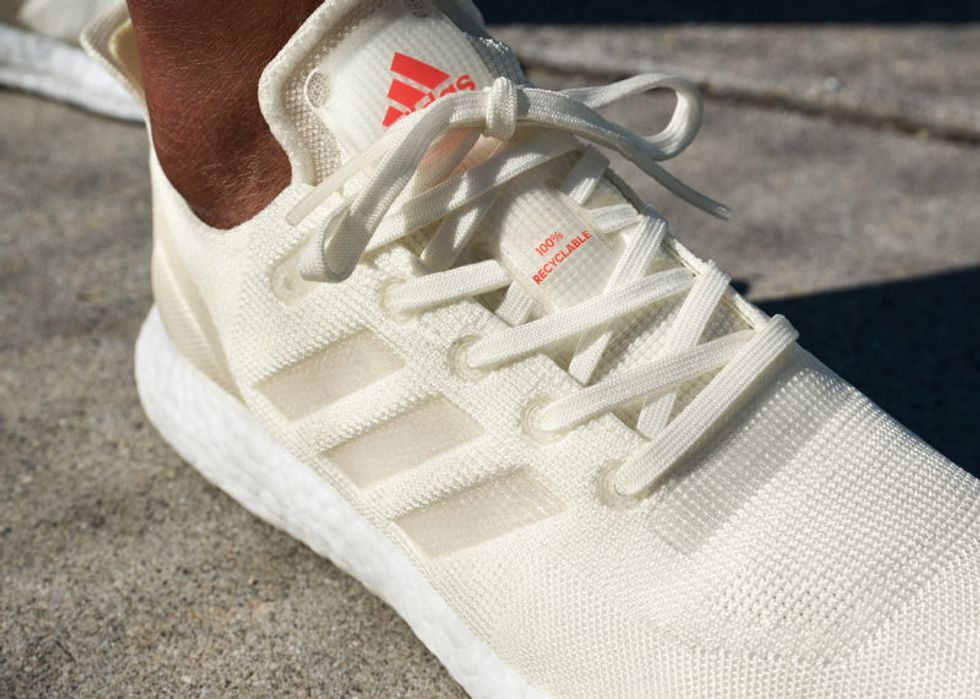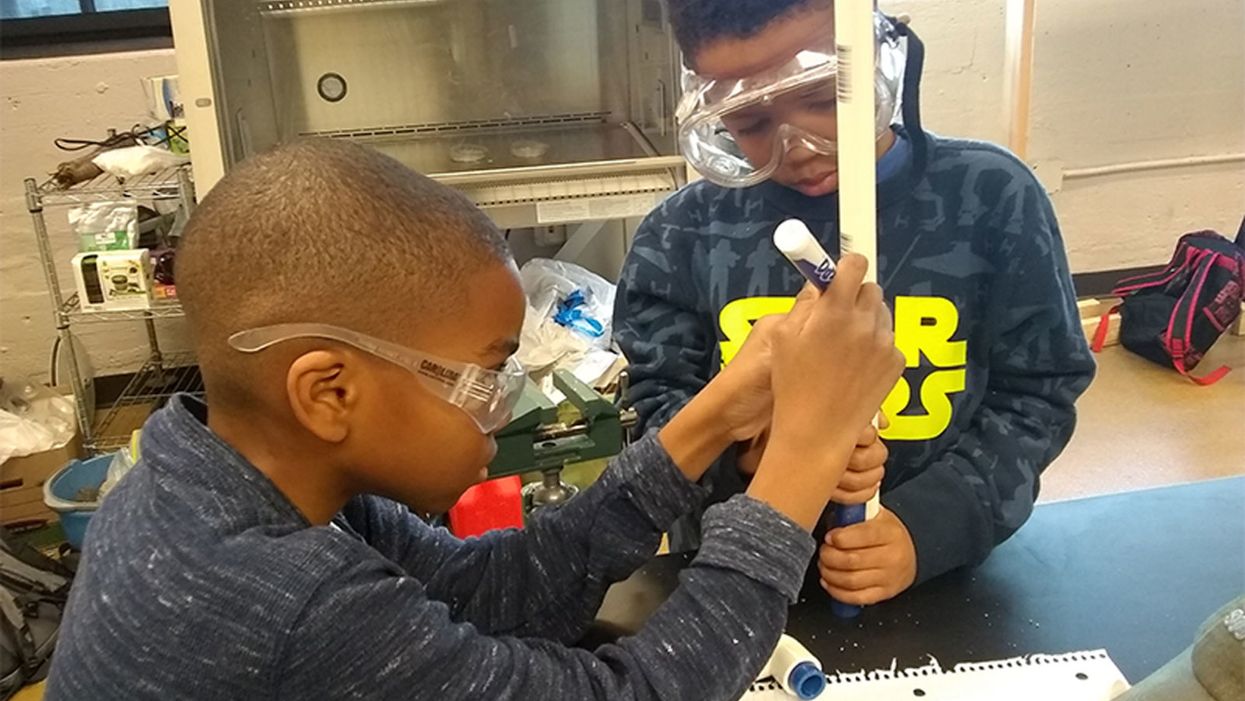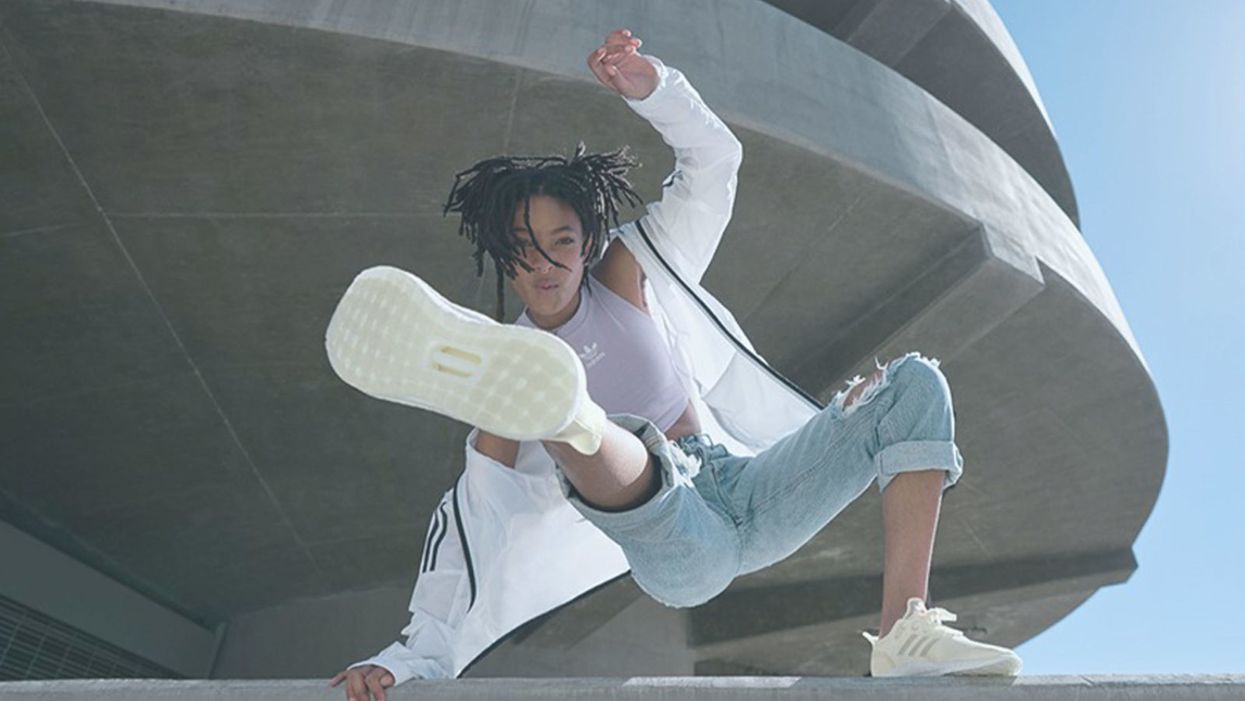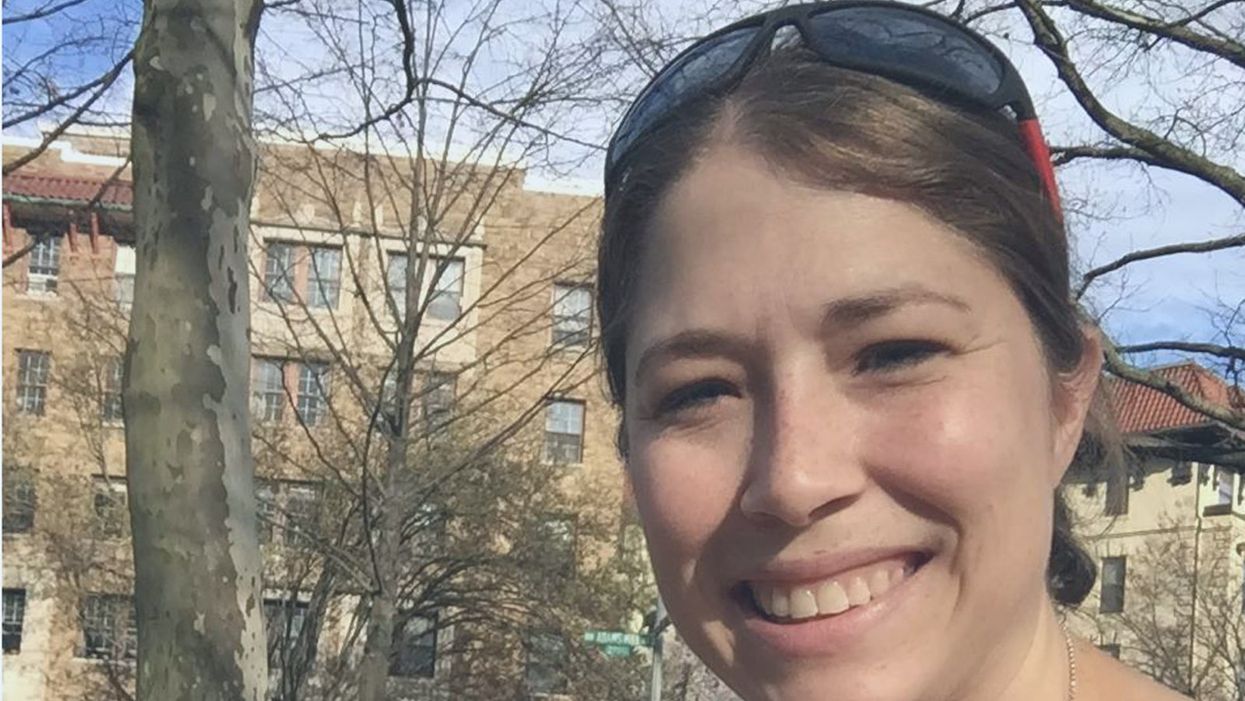A “YMCA for Scientists” Lets Kids and Teens Tackle Real Problems in Real Labs
ECOTEK students Noah Harris, 8, and Amir Muhammad, 10, doing measurements for their wind turbine project.
When Keith Young was a young father shepherding his three children through the Detroit public school system, he felt something was missing.
The students are working on issues ranging from robotics to 3D printing to finding a cure for a rare form of cancer.
"What I'd observed was a gap between the resources that were being offered to university-level folks and in the professional ranks compared to what had been offered to kids in K-12, and in particular, the ones that were in urban and rural communities," he recalls. "There was always a Boys and Girls Camp, always a YMCA. There was never a YMCA for scientists."
Thus, the concept of ECOTEK Lab was born. Young's vision was to narrow that gap -- by financing pop-up labs for students who want to find a scientific solution to hard-to-solve problems that can be found in their own backyards.
He began in 2005, guiding his own children through foundational experiments for eventual startup companies, focusing on climate change, DNA, making biofuels and other fields of research. In addition to the labs, Young says ECOTEK has also reached young people by way of field trips, science fairs, and in-class demonstrations at schools. Young considers himself a venture capitalist, lending resources to kid and teen scientists.

Keith Young, foreground, is the founder of ECOTEK. Behind him, from left, are his daughter, Amber, son, Keith Jr., and ECOTEK students Emmanuel Jefferson and Antoine Crews.
(Courtesy Young)
In 2008, he took a group of six students from Detroit who had been researching brownfields, or previously developed land that's now vacant, and how they affect climate change; their work culminated in a research trip to Cape Town, South Africa, and participation in a conference there.
Today, he's helping transform the lives of around 250 student scientists across the country in places like Detroit, Florida and Maryland. Those students are working on issues ranging from robotics to 3D printing to finding a cure for a rare form of cancer.
Participating students do not receive a grade -- "they have to have passion to do the work." To take part, students must complete an application process and pay a small fee to use the lab, which is based on family resources, Young says. Students usually work in groups of two to three and are matched with a STEM mentor who can help when they run into research roadblocks.
In one lab in Detroit, a trio of teens is working to develop battery technology for smart mobility along with microbial fuel cells. In another lab, students focus on plant-based drug discovery. One of their projects is using plant DNA to better understand how the breast cancer gene mutation called BRCA1 works in the human body. In the African American population, about 35 percent of women with triple-negative breast cancer test positive for this mutation, and they usually don't learn of their diagnosis until the cancer has spread.
ECOTEK students have also had a slightly larger audience – the United Nations.
A third Detroit-based lab is led by Keith Young's daughter and one of ECOTEK's original students: Founder Briana Young, 23, runs a spin-off business called SmartFarms, which works on food security and developing food safety systems for urban farming using advanced drone technology and biochemical sensory systems. According to a recent report, more than 30,000 Detroiters don't have access to a full-service grocery store, and 48 percent are considered food insecure.
"We don't tell them which subjects to do – that's why [the labs] are not working on the same thing," explains Young. "We're trying to give student scientists a place to find their way."
The gap that Young noticed for urban students exists also among rural communities, and the problems they face are different. Students in a lab in Polk County, Florida, decided to tackle citrus greening, a bacterial disease that causes citrus fruit to bear bitter-tasting and underdeveloped fruit. The culprit is the Asian psyllid, a pest common to citrus plants. The problem is so pervasive that it's caused a precipitous decline in the industry, which had been a major one in Polk. At Bok Academy in Lake Wales, also in Florida, students are using drones to get an overhead view of the patterns they can detect to better understand which trees to treat and when.
"With the majority of our area dependent on citrus and various other crops, why not get students involved in problem-solving and research that's going to truly make a difference?" says David Lockett, a STEM facilitator at Bok Academy.
To this end, the students have shared their findings with scientists at the University of Florida and a research lab in Colorado.
A young woman who started in ECOTEK as an elementary-school student will now, at age 24, return to run the research arm of the company.
ECOTEK students have also had a slightly larger audience – the United Nations. The Detroit students have traveled to New York since 2013 to share their learnings with international diplomats from countries like Belize, Cuba, and Antigua.
The students' hands-on experience in the lab often inspires them to pursue academic success across the board at school. Young says that graduating students usually receive an average of $150,000 in college scholarships and score an average of 1450 on the SATs and in the 90th percentile on ACT tests.
Young plans to continue his work to develop these scientists, and after having invested "millions" of dollars of his own money, he's now seeing the fruits of his labor come full circle. A young woman who started in ECOTEK as an elementary-school student will now, at age 24, return to run the research arm of the company.
"It was," he says proudly, "a 14-year investment payback."
Meet the Shoe That Will Never End Up in a Landfill
The adidas FUTURECRAFT.LOOP
Have you ever wondered what happens to your worn-out sneakers when you throw them away? They will likely spend the next few decades decomposing in a landfill.
"You simply take it, grind it up and make a new one. But under the surface, it's extremely technical and complex."
According to the most current government statistics, eight million tons of shoes and clothing were sent to landfills in 2015 alone. As the trashed items break down over many years, they produce toxic greenhouse gases like methane and carbon dioxide, contributing to global climate change.
The Lowdown
Sportswear manufacturer adidas was well aware of their industry's harmful environmental impact, so they set out to become part of the solution. A few years ago, they partnered with various companies to gather and reuse plastics from the ocean to make clothes and parts of shoes.
Then they wondered if they could take their vision a step further: Could they end the concept of waste entirely?
This ambition drove them to create a high-performance athletic shoe made with entirely reusable material – the new FutureCraft Loop. It's a shoe you never have to throw out.
"It's something that outwardly appears very simple," said Paul Gaudio, adidas' Global Creative Director. "You simply take it, grind it up and make a new one. I think that's super elegant and easy to understand. But under the surface, it's extremely technical and complex and it is quite literally a science project."
This project began with a group of engineers, material scientists, and designers trying to find a material that could be pliable enough to take the place of 10-12 different components normally used to make a shoe, yet durable enough to provide the support a running shoe requires. The team decided on thermoplastic polyurethane (TPU), a strong and versatile material that can be re-melted and re-molded even after it's solidified. The team worked for close to a decade on research and development.

Adidas FUTURECRAFT.LOOP
The result, Gaudio said, is an athletic shoe that doesn't compromise on quality and also won't pollute the planet. The wearer will likely notice the shoe feels different because it's welded together by heat alone.
"You feel a more direct connection [to the shoe] because you don't have the layers and glue,"he explained.
Next Up
One of the next steps will be for adidas to engage with consumers to find out the best way to get them to return their used shoes for recycling so that they can, so to say, close the loop.
"We're trying to decide what that looks like," Gaudio said. "Is it a take-back program, is it a subscription mode? Do you return it at stores? So that's the next big challenge that we're working on and that's why we've started to engage people outside the brand in that process."
The FutureCraft Loop is in beta testing with a small group, but if all goes well, the shoe may be available for purchase in early 2021. The pricing hasn't been set, but Gaudio said that the goal is to make it affordable.
"If it's something that's too exclusive or unattainable," he said, "it defeats the purpose."
Open Questions
Although TPU is a completely recyclable material, the team at adidas is working to perfect the process.
"We have a passion to apply creativity and imagination to the problems of plastic in the oceans and the plastic waste."
"Each time you recycle something there is a change – a degradation and contamination," Gaudio noted. "So if I ground the whole thing up, can I make the exact same shoe again with this exact same batch of material today? No, but we can still recycle 100 percent of it. But we're working towards being able to take the knit upper and make a new knit upper."
Gaudio hopes that other companies will follow suit, although adidas is moving to develop ownership of their solutions, including the process behind making the FutureCraft Loop.
"We have a passion to apply creativity and imagination to the problems of plastic in the oceans and the plastic waste and that's what's driving us," he said.
Your Online Therapist Will Message You Now
Jenna Sauber, a Washington, D.C. resident, has tried both online and traditional therapy.
For years, Jenna Sauber took advantage of traditional therapy, setting an appointment with a mental health professional to help her through various life and relationship issues.
"The traditional model of therapy suffers from access barriers that keep enormous numbers of people from getting the care they need."
But when Sauber, 33, needed help extricating herself from a friendship that was becoming toxic, she tried another route of therapy. Life was getting busy for the communications professional from Washington D.C., and Sauber decided it was time to try something new – signing up for an online therapy smartphone app.
She isn't the only one trying therapy on-the-go. The online mental health industry has been booming in recent years, and technology companies – even giants such as Apple and Google – are sensing an opportunity to serve a market that wants to tend to their mental health wherever they are. Some are even tapping virtual reality used with a smartphone to help fight alcohol and nicotine addiction.
For those seeking a sympathetic ear – or text – companies such as Woebot offer a mental health chatbot to help patients relieve their anxiety or depression. Other companies, like Better Help and Talkspace, provide licensed mental health professionals who are available to connect with a patient throughout the day.
Recently, Olympic swimmer Michael Phelps became a brand ambassador for Talkspace after he disclosed his own struggle with depression.
Since Talkspace launched in 2012 by two psychologists, the company says it has worked with more than one million people seeking help.
How It Works
Potential clients fill out a questionnaire, detailing their mental health needs, and are connected with a professional whose specialties align with those needs. Basic text messaging packages are often offered by online therapy companies, as well as live-conversation packages and couples therapy. The average cost of these packages can vary and is usually billed weekly, with the ability to discontinue at any time.
Dr. Neil Lieberman, the Chief Medical Officer of Talkspace, is a board-certified psychiatrist. His background includes the oversight of inmates with severe psychological issues. One of the biggest advantages of online therapy, he says, is its accessibility. More than 70 percent of Talkspace users have never before been in therapy.
"It's a promising, but largely untested way to receive care."
"The traditional model of therapy – brick-and-mortar, 45-minute sessions – suffers from access barriers that keep enormous numbers of people from getting the care they need," Dr. Lieberman says. "Talkspace makes it possible for people to enjoy all the benefits of traditional therapy for a fraction of the cost, and without the need to schedule an appointment, travel to an office or get time off work."
Is It Effective?
This industry, while fast-growing, is still young. Psychiatric professionals are still trying to gauge its success, and whether it's providing the support its clients seek.
Dr. Vaile Wright, a licensed psychologist and the director of research and special projects with the American Psychological Association, says there isn't a lot of research available regarding online therapy.
"It's a promising, but largely untested way to receive care," says Wright.
She describes a spectrum of online therapy-type products available to consumers, ranging from meditation apps to videoconferencing services with a live therapist.
"There may be someone who doesn't necessarily need a mental health diagnosis but could use the mindfulness app to really feel more centered. What we generally see and what we think is probably effective is the use of these apps in conjunction or as an adjunct to a face-to-face ongoing relationship."
The APA offers a set of guidelines for professionals and for consumers that highlight issues that potential patients should consider before choosing online therapy, along with research material and other sources for help, depending on the condition.
There are still a lot of unknowns about online therapy, including potential security, confidentiality, privacy laws, and emergency situations, Wright says. "Consumers do need to be aware of that."
Lieberman says that the Talkspace app and website is encrypted to protect information. The company has also been certified as HIPAA compliant, meaning that the company must have a system in place to protect patient information.
"We take privacy, security, and confidentiality very seriously," he says.
For Sauber and her problematic friendship, online therapy was ultimately a let-down.
"She was very nice," Sauber says of her app therapist. "She would check in twice a day, once during the day and then at night. I'd type out what was going on and she would chime in that night or the next morning. It wasn't truly real-time unless you happened to be online with her window. I found that I was typing in huge paragraphs of what was happening and then me waiting for her to respond." Eventually, Sauber left the friendship on her own and quit the app.
When she decided to get help for sleeping issues last fall, she found her way back to a traditional therapist. And although her schedule was still tight, she was able to schedule FaceTime sessions with the therapist, which helped. The sleep issues, she felt, required a relationship with a live therapist who could notice how her body was responding to stressors.
Wright says that the live aspect of traditional therapy can be instructive in guiding a patient's care.
"Being face-to-face allows a therapist to pick up on body language. Maybe a person looks away when they're talking about a particular topic, or somebody's affect doesn't match up with the content of what they're talking about. For example, they're talking about something that's traumatic and yet they're smiling. That kind of nuance can be lost in texts or even e-mails."
Still, Sauber said she could see the benefits of the apps for different types of personalities and situations.
"I can see it being helpful for people who may not be comfortable being in person with someone because they're shy or just uncomfortable about their body language or may be just better communicating behind a screen," she said.
As far as the future of this kind of therapy, Lieberman says that Talkspace is hard at work expanding its network of clinicians and investing in research and science. The company is also working to develop partnerships with employers and health plans to offer the service to more people.
"Our intention to is to make therapy – a profession we think can lead to meaningful change in anybody's life – as common as going to the dentist or hitting the gym."
"These technology-based approaches can supplement the face-to-face work that you do."
[Correction: An earlier version of this article mistakenly implied that the company Woebot offers licensed mental health professionals to speak with patients. Woebot offers a chatbot service, a fully automated conversational agent, to help patients with anxiety and depression.]



